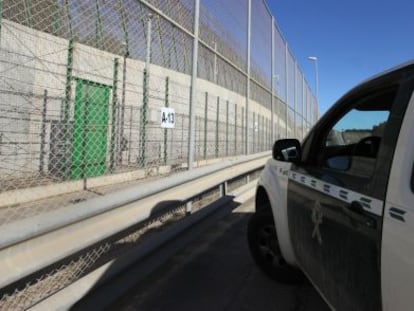Interior Minister admits to “isolated” cases of illegal migrant handovers
Video shows sub-Saharan immigrants being expelled through border fence to Morocco
Interior Minister Jorge Fernández Díaz admitted for the first time on Tuesday that “there may have been isolated cases” in which the Civil Guard violated the law by handing back to Morocco sub-Saharan immigrants who had jumped the security fence into the Spanish North African exclaves of Ceuta and Melilla.
“If the actions strayed from the principle of respect for human rights, it is something sporadic,” the minister said. “As a general rule, both the Civil Guard and the police act within the margin of the law respecting human rights,” he emphasized at an event concerning the police presence on the social networks.
His comments came in answer to a question about the release of a video by Melilla-based NGO Prodein, which EL PAÍS posted on its website on Tuesday, showing how the Civil Guard gathered together sub-Saharan migrants at gate A13 of the Melilla fence with the intention of illegally expelling them to Morocco.
The images were filmed on January 15, a few hours after 450 sub-Saharans had tried to scale the fence, which is in fact a series of barriers with a lane for patrol vehicles. Only 60 made it across, many of whom were injured by the concertina wire that returned to part of the Melilla fence at the end of last year.
The minister’s words contradict those of the government delegate in Melilla, who flatly denies such expulsions
Fernández Díaz’s words contradict those of the central government’s delegate in Melilla, Abdelmalik el Barkani, who has always flatly denied that such expulsions occur. The minister’s remarks also put into question those of Civil Guard director general Arsenio Fernández de Mesa, who last November said he was considering whether to undertake legal action against all those who doubted the legality of his force’s actions.
The video is a new piece of evidence demonstrating that this practice, which violates Spain’s immigration law, exists, and, as such, can be added to an audio recording revealed by EL PAÍS last November and numerous testimonies from immigrants themselves.
The immigration law states that migrants who enter Spain illegally will be taken “as quickly as possible to the corresponding police station […] so as to proceed with their identification and, where applicable, their return.” They will have the right to legal assistance, as well as to an interpreter.
The interior minister made one other surprising revelation on Tuesday when he admitted that gate A13 was the only spot on the Melilla fence where there were no security cameras, as activists and human rights organizations had previously noted. The absence of cameras means that the so-called on-the-spot handovers cannot be recorded. Fernández Díaz said he would examine the system.
Tu suscripción se está usando en otro dispositivo
¿Quieres añadir otro usuario a tu suscripción?
Si continúas leyendo en este dispositivo, no se podrá leer en el otro.
FlechaTu suscripción se está usando en otro dispositivo y solo puedes acceder a EL PAÍS desde un dispositivo a la vez.
Si quieres compartir tu cuenta, cambia tu suscripción a la modalidad Premium, así podrás añadir otro usuario. Cada uno accederá con su propia cuenta de email, lo que os permitirá personalizar vuestra experiencia en EL PAÍS.
En el caso de no saber quién está usando tu cuenta, te recomendamos cambiar tu contraseña aquí.
Si decides continuar compartiendo tu cuenta, este mensaje se mostrará en tu dispositivo y en el de la otra persona que está usando tu cuenta de forma indefinida, afectando a tu experiencia de lectura. Puedes consultar aquí los términos y condiciones de la suscripción digital.









































